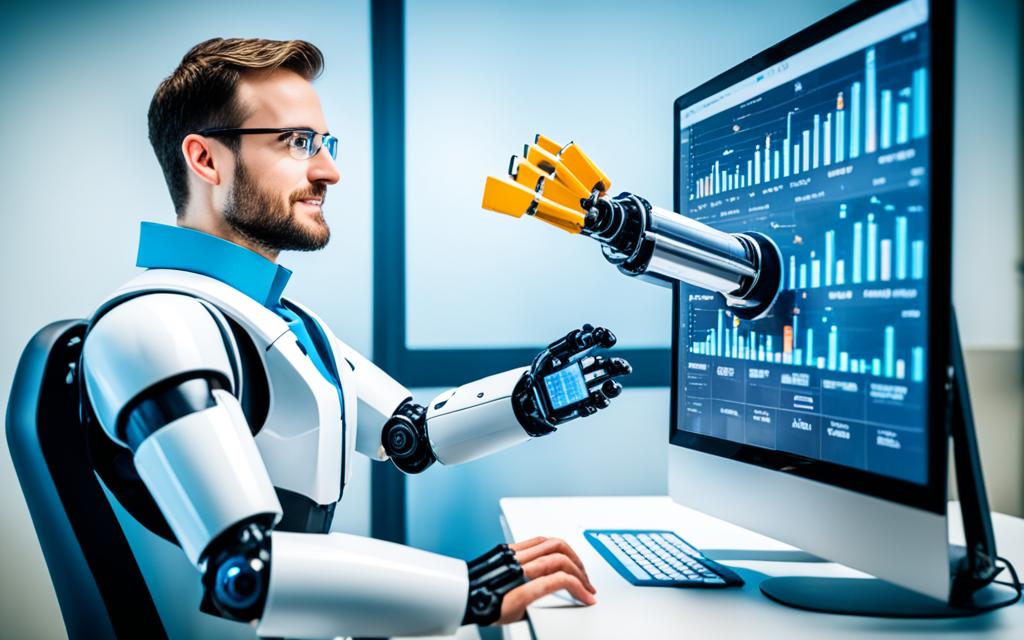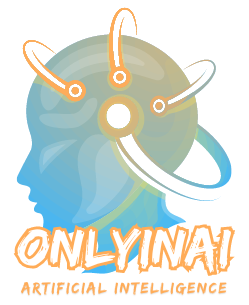Did you know the average office worker spends 28% of their workweek on emails? That’s over 11 hours per week lost just checking emails. Thanks to AI productivity tools, we can now get those hours back and work more efficiently.
AI is changing how we manage our daily tasks and schedules. It helps with automated scheduling and smart task prioritization. These smart solutions aim to free up your time and make your workflow smoother. By using AI for time management, you can focus on what’s important. Leave the boring tasks to your digital assistant.
Let’s see how AI can help you save time and boost your productivity. Whether you’re a busy professional or an entrepreneur with many projects, AI-powered time management could be the game-changer you need.
Key Takeaways
- AI productivity tools can save up to 11 hours per week on email management
- Automated scheduling and task prioritization streamline workflows
- AI-driven time management solutions enhance focus on important tasks
- Smart tools adapt to your work habits for personalized efficiency
- Implementing AI in your routine can lead to significant time savings
Understanding AI-Powered Time Management
Time management has changed a lot since the days of to-do lists and paper planners. Now, AI tools are changing how we plan our days and increase productivity. Let’s dive into this new era and see how it affects our work.
The Evolution of Time Management Tools
Time management tools have evolved from paper calendars to digital apps. AI virtual assistants are now leading the way, offering smart solutions tailored to our work habits. These tools learn our habits, making planning and managing tasks more efficient than ever.
How AI is Revolutionizing Productivity
AI is making a big impact on productivity for busy professionals. These smart systems can:
- Automatically schedule meetings
- Prioritize tasks based on deadlines and importance
- Provide real-time updates on project progress
- Suggest the best times for focused work
AI takes care of these tasks, giving us more time for creative thinking and making important decisions.
Benefits of AI-Driven Time Management
Using AI in time management brings many benefits:
- Reduced administrative burden
- Improved accuracy in time tracking
- Personalized productivity recommendations
- Data-driven insights for better decision-making
These advantages lead to smoother workflows and better use of our time.
| Feature | Traditional Tools | AI-Powered Tools |
|---|---|---|
| Scheduling | Manual input | Automated with learning capabilities |
| Task Prioritization | User-defined | Intelligent analysis and suggestions |
| Adaptability | Static | Dynamic and personalized |
| Insights | Limited or none | Comprehensive data-driven analytics |
As AI gets better, we’ll see more innovative ways to manage our time. The future of productivity looks bright with these smart assistants helping us.
The Impact of AI on Daily Scheduling
AI scheduling has changed how we plan our days. We no longer have to set up tasks and meetings by hand. Now, smart tools make schedules for us, saving our focus time and finding the best times for working together.
Using AI for time management has big benefits. These smart systems look at our work habits, likes, and what’s important to us. They then make schedules that help us work better. This means we have more time since we’re not spending it on paperwork.
AI-powered scheduling tools are great at:
- Reducing back-and-forth emails for meeting times
- Keeping blocks of time just for focusing
- Showing the best times for different tasks
- Changing schedules based on what’s happening now and what’s important
AI also helps teams work better together. It finds meeting times that work for everyone. This makes time management better, letting everyone focus on important work, not just paperwork.
“AI scheduling has transformed my workday. I now have more time for creative tasks and strategic thinking.” – Sarah Chen, Product Manager
As AI gets better, we’ll see even more ways to manage our time well. These new tools will make our schedules even better, leading to a better balance between work and life and making us more efficient.
AI-Powered Task Prioritization Techniques
AI is changing how we handle our tasks every day. It uses machine learning to study our work habits. Then, it helps us focus on what’s most important.
Machine Learning Algorithms for Task Analysis
Smart algorithms look at your tasks and figure out what’s urgent and important. They check deadlines, project size, and your energy levels to order your tasks wisely.
Personalized Priority Recommendations
AI doesn’t just sort tasks; it gets to know your work style. It might recommend doing tough projects in the morning when you’re fresh. Or, it could group similar tasks to make you more efficient. These tips help you work smarter, not harder.
Adaptive Task Scheduling Based on Performance
Your productivity can change, and AI catches on. If you finish tasks quickly, it adjusts your schedule for the future. This way, your day stays on track as you get better or your workload changes.
| Feature | Benefit |
|---|---|
| Real-time task analysis | Instant prioritization updates |
| Performance tracking | Continuous workflow optimization |
| Personalized insights | Tailored productivity strategies |
By using these AI-powered methods, you can change how you manage tasks. The outcome? A more productive, less stressful day that fits your unique needs and goals.
Automating Repetitive Tasks with AI

AI is changing how we work. It takes over repetitive tasks, giving us more time for strategy. This lets professionals focus on creative and decision-making tasks.
Time tracking is a great example of AI in action. Tools like Timely use AI to log time automatically. This saves hours each week by eliminating manual input.
AI also excels in email management. Superhuman, an AI-powered email client, sorts messages and answers quickly. This reduces time spent on managing the inbox.
| Task | Time Saved (per week) | AI Tool |
|---|---|---|
| Time Tracking | 3-5 hours | Timely |
| Email Management | 5-7 hours | Superhuman |
| Data Entry | 4-6 hours | Zapier |
To use AI to save time, first identify tasks that take up too much of your day. Look for repetitive tasks that don’t need complex decisions. These are perfect for AI automation.
Using AI for repetitive tasks can give you back hours each week. This extra time can be used for activities that move your business forward.
How to Free Up Your Time with AI
Start by finding out what takes up most of your day. AI tools can make your work flow better and help you work smarter. Let’s see how to use these technologies to manage your time better with AI.
Identifying Time-Consuming Activities
Keep track of your daily tasks for a week. See which ones take a lot of time or are repetitive. Things like checking email, setting up meetings, and entering data often take up too much time. AI can automate these tasks, leaving you more time for important work.
Selecting the Right AI Tools for Your Needs
Pick AI tools that tackle your biggest time-wasters. For instance:
- Email management: Use AI-powered filters to sort and prioritize messages
- Scheduling: Try AI assistants that find optimal meeting times
- Data entry: Implement AI-driven OCR technology to digitize documents
Implementing AI Solutions in Your Workflow
Start adding AI tools to your daily routine step by step. Begin with one task and add more as you get used to it. The aim is to make you more productive, not to add more stress. Check how these tools affect your time management regularly.
| Task | AI Solution | Time Saved (per week) |
|---|---|---|
| Email Management | AI-powered filters | 3-5 hours |
| Meeting Scheduling | AI scheduling assistant | 2-3 hours |
| Data Entry | OCR Technology | 4-6 hours |
Using AI tools can give you back hours each week. This extra time lets you focus on important tasks. It helps you grow both personally and professionally.
AI Virtual Assistants: Your Personal Time Managers

AI virtual assistants are changing how we manage our time. They act as personal time managers, handling various tasks to free up your schedule. They work with productivity tools to give you a single place for managing your daily tasks.
These assistants are great at scheduling meetings, setting reminders, and finding information. As you use them, they learn what you like and do, making them more efficient and tailored to you over time. This makes them very useful for anyone wanting to make their daily tasks easier.
“AI virtual assistants are like having a personal secretary in your pocket, always ready to help you stay on top of your schedule.”
To use AI to save time, first figure out what takes up most of your day. Then, pick an AI assistant that fits your needs. You can choose from Siri, Google Assistant, and Alexa. These tools can manage your calendar, answer emails, and more, giving you more time for what’s important.
- Schedule meetings and appointments
- Set reminders for important tasks
- Provide quick answers to questions
- Manage emails and notifications
Using AI virtual assistants can help you get back hours in your day. They are a smart way to increase productivity and keep a good balance between work and life. As these technologies get better, they will offer even more ways to save time and improve efficiency.
Optimizing Workflow with AI-Driven Insights
AI workflow optimization tools are changing how we work. They analyze data to give us insights. This helps us make smarter choices about our work habits.
Data-Driven Decision Making
AI-powered platforms collect and process lots of data about your work. This info helps you decide how to allocate tasks and manage your time better.
Identifying Productivity Patterns
AI tools track your daily activities and show trends in your productivity. They find out when you work best and which tasks take up most of your time. This info helps you plan your day for better performance.
Continuous Improvement Strategies
AI doesn’t just give data – it offers tips for getting better. These tools learn from your habits and change their advice over time. This means your workflow keeps getting more efficient.
| AI Feature | Benefit |
|---|---|
| Activity Tracking | Identifies time-wasting activities |
| Pattern Recognition | Reveals optimal work hours |
| Adaptive Suggestions | Provides personalized productivity tips |
Using these ai productivity tools can make your workflow more efficient. They give you the insights you need to use your time better, increase productivity, and find a better balance between work and life.
Overcoming Time Management Challenges with AI
Time management can be tough, but AI is here to help. It helps you beat issues like putting things off and not knowing what to do first. Let’s see how AI can make your life easier and help you manage your time better.
AI tools send you reminders to keep you on track. They look at how you work and send alerts at the right time. This stops you from putting things off and keeps you focused all day.
AI makes it easy to figure out what tasks are most important. It looks at deadlines, how important they are, and how you work. This means you don’t have to spend time deciding what to do first. You can jump right into what’s most important.
“AI has transformed my workday. It’s like having a personal time management coach that knows exactly what I need to focus on.”
Figuring out how long a task will take can be hard. But AI makes it simpler. It uses past data and similar projects to give you better time estimates. This helps you plan your day better and avoid taking on too much or not enough work.
With these AI tools, you can beat time management problems and get more done. Use AI to take charge of your schedule and do more in less time.
AI Tools for Effective Time Tracking and Analysis
AI-powered time tracking tools are changing how we handle our work hours. They give us clear insights into our daily tasks. This helps us work more efficiently and make smart decisions based on data.
Automated Time Logging
No more filling out timesheets by hand. AI-driven time trackers log your activities automatically. They cut out mistakes and save time. These tools can tell which apps you’re using and sort your tasks.
Intelligent Reporting and Visualization
AI doesn’t just track time; it turns data into useful insights. It creates charts and graphs of your work habits. This shows you where you’re most productive and where you can do better.
| Feature | Benefit |
|---|---|
| Activity Heatmaps | Identify peak productivity hours |
| Project Timelines | Track progress and deadlines |
| Task Breakdown Charts | Analyze time spent on different activities |
Predictive Time Estimation
AI time tracking tools can predict how long tasks will take in the future. They look at past data to guess how long similar tasks will take. This helps with planning projects and using resources wisely.
As AI gets better, we’ll see more advanced ai task automation features. These will make managing our time even easier, making us work more efficiently and productively.
Balancing Work and Personal Life with AI Assistance
Finding a balance between work and personal life is tough, but AI virtual assistants can help. These smart tools offer a new way to manage your time. They make it easier to handle both work and personal tasks. By using AI, you can make more time for yourself and live a balanced life.
AI-powered schedulers can plan your day to fit work and personal activities. They look at your habits and likes to find the best times for breaks, exercise, or family time. This smart planning makes sure you don’t miss out on important life moments while staying on top of work.
AI assistants are great at reminding you to take a break after work. They push you to leave your desk, helping you avoid burnout. By handling personal tasks alongside work, these tools give you a full view of your time. This helps your overall well-being and makes you more productive in every area of life.
Using AI virtual assistants to save time can make your life more rewarding. With their help, you can find a better balance between work and personal life. This reduces stress and makes you happier in both areas. It’s time to let AI help you create the balanced life you’ve always wanted.


